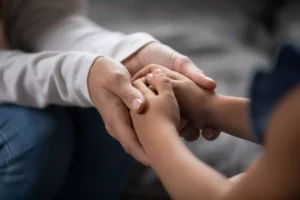Our lives changed forever on Good Friday, 2004. As my husband, Brett, mowed the lawn on our riding lawnmower, he didn’t see our 3-year-old son, Jake, run up from behind. Brett looked over his shoulder before putting the mower in reverse, but Jake was too small to see. In an instant Jake was underneath the mower.
I was at work when I received the call. “Something horrible happened,” Brett sobbed. He could barely speak the next words: “I backed over Jake with the riding lawnmower.”
In that instant, my world stood still. Thankfully, Jake had not been killed. But the blades had amputated three of his toes and done extensive structural damage to his right knee and thigh. Little did I know that his physical injuries would consume our family for the next six years. Jake would endure 16 limb salvage surgeries, and at age 8 become an amputee.
Although the physical damage was extensive, the emotional damage was more difficult. In an instant we found ourselves in unchartered territory. We called upon God, turned to His Word and sought counsel to survive each day. Eventually we discovered our new normal, and I have found comfort in sharing the lessons we have learned. Here are four ways to help your child navigate personal tragedy.























